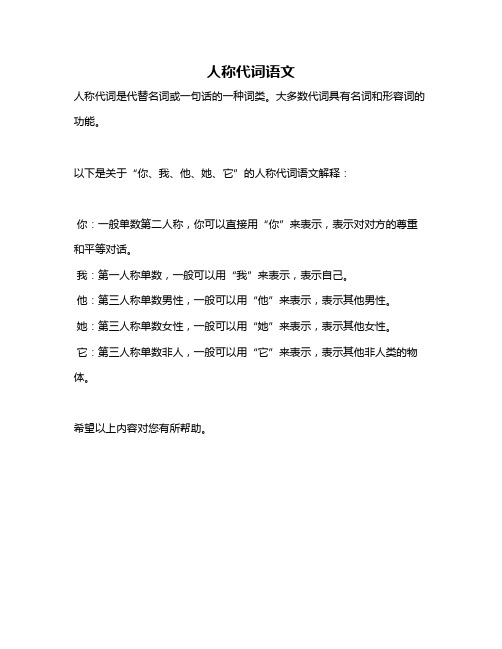人称代词
人称代词

人称代词
我们平时这样说吗?
小明说今天不来上课了,因为小明今天生病了, 他 小明要到医院去看病。 他
人称代词
1、定义: 代替人,事物名称的词叫做人称代词
人称代词有:你,我,他(她、它),你们, 我们,他们等
人称代词
2、人称代词有人称,数和格的区别;第三人称代词还有性 的区别。 3、人称 人称一共有三个:第一人称 第二人称 第三人称 第一人称:我 我们 第二人称:你 你们 第三人称:他、她、它、他们以及除第一,第二人称以外 的一切称呼(名称) 4、数 单数 复数
I am me . You are you . We are Chinese. i am Sandy. Sandy is me. They are Tom and Jack, and I like them. Please wait for me.
人称代词
5、格 主格 宾格 所有格
主语的位置用 主格 ,宾语的位置用 宾格 在主动语态中主语通常是动作的发出者,宾语通常 是动作承受者。 我爱你:主谓宾
人称代词
动宾短语:动词的后面是宾语,用宾格。 Like you.喜欢你 you 是宾格 介宾短语:介词后面是宾语,用宾格 Look at me.看我 it’s on me 我请客 飞机在我们上空飞行。 The airplane is flying above us.
人称代词
6、人称代词的内容
人称代词 格 人称、 格 数 主格 宾格
第一人称
单数
复数
I
we you you he she it they 主语
me
us you you him her it them 宾语、表语来自第二人称单数 复数
第三人称
汉语人称代词

汉语人称代词汉语人称代词是指在汉语中指代人物的特有词汇,文言文和现代白话文均有其人称指代的专有词汇。
典型人称代词包括自称代词、对称代词和他称代词,它们体现人物之间的客观关系。
第一人称中文第一人称包括使用中文、汉语的人用于指代说话、书写者自己的人称代词。
有时汉语复数,如“我们”,可以指单数;例如行政官员发言时用“我们”以示代表整个政府发言。
第一人称代词主要有:我、吾、余、予、朕、卬、台、言、侬(侬家、阿侬)、身、咱、昝(喒、偺)、俺、洒家、某、某甲、某乙等等。
自称代词的考论以传统难点“我”、“吾”的区分为重点,着重对比考察了上述自称代词的产生、发展演变过程及其语法、语用等方面的特点和相互间的差异,并补入了以前很少论为自称代词的“某、某甲、某乙”。
现代汉语•我、我们:最常见中文第一人称代词。
•咱、咱们:比较常用中文第一人称代词。
其中“咱们”通常包括聆听、阅读者,而“我们”可能包括,也可能不包括。
中国东北方言“咱们”的用法相当于“我们”。
•本人:多用于书面语。
•人家:多为女性所使用,古义中性,今义则带有撒娇或挑逗等亲密关系意味。
例:《红楼梦》第九十二回:袭人啐道:“小蹄子,人家说正经话,你又来胡拉混扯的了。
”职业•本席:司法官或民意代表自称方言•俺、俺们:山东等地•我、我米(我么):晋语•我伲(吾伲)、阿拉:吴语•侬:吴语(在其他地区方言不一定是第一人称)•阮:闽南语•我、我哋:广府话•涯、涯等:客家话网络用语•偶(台湾、大陆)•禾(港女)古汉语常用“等”为复数•余、予•卬•吾(单数)、吾人(单、复数用法皆有)、吾辈(复数)•洒家:宋代君王贵族•朕:秦皇朝之前为第一人称,秦代以后成为皇帝专用自称。
及至清代,“朕”已成奏折书面语。
像康熙,平时自称“我”,只在公文才自称“朕”•予一人:先秦天子自称•孤、孤家、不谷、寡人:君主、诸侯等的自谦之词•本王:亲王•哀家:死去丈夫的皇太后、太妃•本宫:皇后、妃嫔、公主、王妃•寡小君、小童:先秦时诸侯妻自称,秦代之后为皇后自称•梓童:皇后自称(亦用于皇帝称呼皇后)•本座:有名望、地位之人,如大官、教主。
人称代词

一、人称代词表示“我”、“你”、“他”、“她”、“它”、“我们”、“你们”、“他们”的词,叫做人称代词。
人称代词有人称、数和格的变化,人称代词主格:作主语,表示谁怎么样了、干什么了。
人称代词:1.人称代词分为第一、第二、第三人称,且有单复数之分。
2.人称代词的主格在句中做主语,一般用在动词前(疑问句除外)。
3.人称代词的宾格在句中做宾语,多用于动词、介词后。
4.人称代词能代替表示人称的名词。
主格用于动词前,宾格用于动词后。
I am a teacher. You are student. He is a student, too.We/You/They are students.人称代词宾格作宾语,表示动作行为的对象。
Give it to me. Let’s go (let’s =let us)二、物主代词表示所有关系的代词叫做物主代词,也可叫做代词所有格。
物主代词分形容词性物主代词和名词性物主代词二种,形容词性物主代词(my/your/his/her/its/our/their)+名词而名词性物主代词则相单于形容词性物主代词+名词,故其后不必加名词。
物主代词:1.表示所有关系的代词叫做物主代词。
2.物主代词分为形容词性物主代词和名词性物主代词。
物主代词也有人称和数的变化。
3.形容词性物主代词起形容词的作用,后面一定要跟名词,表示该名词所代表的事物是属于谁的。
4.名词性物主代词=形容词性物主代词+名词,包含有名词,所以后不跟名词。
如:Is this your book?No,,it isn’t,it’s hers(her book). This pen is mine.你知道形容词性物主代词和名词性物主代词的区别吗?1、.形容词性物主代词起形容词的作用,用在名词前。
This is my book. 这是我的书。
We love our motherland. 我们热爱我们的祖国。
2、名词性物主代词起名词的作用。
人称代词

一、用适当的人称代词填空 。
She is my aunt. We often visit _______. her 1. ______ ( she ) It 2. China is a developing country. _____is in the east of Asia. ( its ) it 3. What day is ______today? — _____ It is Thursday. (its) mine ( I ) 5. I own a blue bike. The red one isn’t _____. 6. These new houses are so nice. _____are very expensive.( them ) Their She studies in a primary school. (she) 7. Ling Ling is a girl. ____ He is good at Engliush . ( his ) 8. Mike is my classmate. ____ her ? ( she ) 9. Kate wants a glass of milk. Will you pass it to ____ It is cloudy. ( its ) 10. What’s the weather like today ? ____
而名词性物主代词则相当于形容词性物主代词+名词,故 其后不必加名词。如: Is this your book? No,,it isn't, it's hers(her book) This pen is mine.
专项练习
一、按要求写出下列代词的形式
me his 1、I(宾格)________ 2、he(形容词性物主代词)________ them 3、 us(主格)________4 、they(宾格)________ we
汉语中的人称代词

汉语中的人称代词汉语中的人称代词,以下是具体内容:1、第一人称:吾余我2、鄙人、小人(自己的谦称)3、臣(官员面对皇帝的谦称)4、奴才(清朝人对自己的谦称)5、奴家(女人对自己的谦称)6、谦称:①自称:愚、鄙、敞、卑、窃、臣、仆②帝王自称:孤、寡、不谷③读书人自称:小生、晚生、晚学④其它:在下、小可、老朽、妾、老纳等7、第二人称:汝尔你您你们8、阁下(对别人的尊称)9、先生(对男性的尊称)10、卿(对别人的尊称)11、敬称:? 称帝王:万岁、圣上、圣驾、天子、陛下? 称天子:殿下? 称将军:麾下? 称对方或对方亲属:有令、尊、贤、仁。
令,意思是美好,用于称呼对方的亲属。
如令尊(对方的父亲),令堂(对方的母亲),令阃(kǔn)(对方的妻子),令兄(对方的哥哥),令郎(对方的儿子),令爱(对方的女儿);尊,用来称对方有关的人或物。
如尊上(称对方的父母),尊公、尊君、尊府(皆称对方父亲),尊堂(对方的母亲),尊亲(对方亲戚),尊驾(称对方),尊命(对方的嘱咐),尊意(对方的意见);贤,用于称平辈或晚辈。
如贤家(称对方),贤郎(称对方的儿子),贤弟(称对方的弟弟)。
仁,表示爱重,应用范围较广。
如称用辈友人中长于自已的人为仁兄,称地位高的人为仁公等。
? 称年老的为:丈、丈人(后来指妻父)又称“泰山”,妻母称丈母,“泰水”。
? 称谓前加“先”,表示已死。
? 对尊长者和同于朋辈间的称谓有:君、子、公、足下、先生、大人等。
12、第三人称:之他她它他们她们它们10、社会亲戚关系? 九代:玄祖曾祖祖父父亲自己子女孙子曾孙玄孙? 公辈:爷爷伯公(叔公)外公舅公姑公姨公姻公? 父辈:爸爸伯叔姑姑公婆继父妈妈舅舅姨妈岳丈继母表叔姨叔庚叔义父师太亲家姻伯? 平辈:兄弟姐妹夫妻姑嫂弟媳(妹)姐(妹)夫大伯子小叔子内弟襟兄(老挑)小姨子大姨姐舅母堂兄族兄表兄姨兄义兄亲家同年老庚邻舍同事同学朋友? 子辈:子媳女婿侄甥内侄外甥表侄姨侄学生徒弟? 孙辈:孙外孙侄孙孙媳内侄孙表侄孙姨侄孙孙女孙女婿。
人称代词

1.
I ________(我) am a teacher.
me 2. My father is talking with _______(我). my 3. This is _______(我的) book. His 4. _______(他的) chair is blue. Our 5. _______(我们的) classroom is big. He 6. _______(他) often plays basketball after school.
1. This is(my / I)mother. 2. Nice to meet (your / you). 3. (He / His)name is Mark. 4. What’s(she / her)name? 5. Excuse(me / my / I).
6. Are(your / you)Miss Li? 7. (I / My)am Ben. 8. (She / Her)is my sister. 9. Fine , thank (your / you). 10. How old is (he / his)
3. 注意:在使用名词性物主代词时,必须有特定的语言 注意:在使用名词性物主代词时, 环境,也就是要省略的名词大家已经知道,已经提起过。 环境,也就是要省略的名词大家已经知道,已经提起过。 例: It”s hers. 是她的。 单独使用大家不知是怎么回事, 是她的。 单独使用大家不知是怎么回事, 不可以这样用) 不可以这样用) There is a book. It”s hers. 那有本书。是她的。 那有本书。是她的。 先提及,大家才明白) (先提及,大家才明白) 4.名词性的物主代词在用法上相当于省略了中心名词的 名词性的物主代词在用法上相当于省略了中心名词的 --'s属格结构,例如: 属格结构, 属格结构 例如: Jack's cap 意为 The cap is Jack's. His cap The cap is his. 意为
人称代词有哪些

人称代词有哪些
人称代词是指直接指代人或者事物的代词。
在英语和汉语中都有三种人称代词即:
第一人称(我;我们),第二人称(你;你们),第三人称(他、她、它;他们、她们、它们)。
根据人称代词在句中所充当的成分可以分为主格人称代词、宾格人称代词。
另外,人称代词有单复数之分,特别是第二人称单复数写法都是一致的,实际翻译时应当注意。
通用的第三人称代词“其”与“之”可泛指人、事、物,涵盖“他”“她”“它”“他们”“她们”“它们”。
有第一人称、第二人称、第三人称之分,还有己称、旁称和尊称等。
第一人称,又叫自称。
常用“吾”“我”“余”“予”等,还有帝王专称“朕”、“孤”“寡人”等字。
通常都可译为
“我”“我的”“我们”“我们的”。
第二人称,又叫对称。
常用
“尔”“汝”“女”“若”“乃”“而”等。
通常译为“你”“你的”“你们”“你们的”。
第三人称,又叫他称。
常用“彼”“其”“之”等字,它们既可以用来指人,又可以用来代事,其用法更为灵活,通常译为“他”“她”“他的”“他们”“他们的”等。
还有旁称,亦即称别人,常用“人”字,可译为“别人”“人家”。
人称代词语文

人称代词语文
人称代词是代替名词或一句话的一种词类。
大多数代词具有名词和形容词的功能。
以下是关于“你、我、他、她、它”的人称代词语文解释:
你:一般单数第二人称,你可以直接用“你”来表示,表示对对方的尊重和平等对话。
我:第一人称单数,一般可以用“我”来表示,表示自己。
他:第三人称单数男性,一般可以用“他”来表示,表示其他男性。
她:第三人称单数女性,一般可以用“她”来表示,表示其他女性。
它:第三人称单数非人,一般可以用“它”来表示,表示其他非人类的物体。
希望以上内容对您有所帮助。
- 1、下载文档前请自行甄别文档内容的完整性,平台不提供额外的编辑、内容补充、找答案等附加服务。
- 2、"仅部分预览"的文档,不可在线预览部分如存在完整性等问题,可反馈申请退款(可完整预览的文档不适用该条件!)。
- 3、如文档侵犯您的权益,请联系客服反馈,我们会尽快为您处理(人工客服工作时间:9:00-18:30)。
选择适当的人称代词填空。
(8%)1._____ (He/I) is my father.2. _____ (She/They) are Tom’s grandparents.3. _____ (We/I) am Jim’s new friend.4. Look at that white dog. _____ (They/It) is my brother’s.5. Where are _____ (you/he from?6. Do you like collecting stamps? Yes, _____ (you/we) do.7. _____ (He/I) am a student at Heyang Primary School.8. _____ (You/They) are my brother’s English teacher.九、用人称代词的主格和宾格填空。
(8%)1.Don’t pa ss it to _______ (他).2. _____ (她) is watching a running race.3. Would you like to go with_____(我们).4. Do you want to join_____(我).5. Tomorrow is my father’s birthday. This present is for______.6. The ball is Su Hai’s. Please give _____ to _____.7. What are Tom’s sisters doing? _____ are seeing a Beijing opera show.十、填入适当的物主代词。
(10%)1. _____ (他的) coat is black, but _____(她的) is red.2. Whose wallet is this? It’s _____ (我的).3. Whose wallet is that? It’s _____ (我的) wallet.4. Are these _____ (你们的) skateboards? Yes, they’re_____ (我们的).5. I’m a new student._____ name is Helen.6. Nancy is my cousin. _____ eyes are big.7. Look, this is his new book. _____ (我的) is as new as his.8. What do people usually do at the Spring Festival. They visit _____ relatives and friends.十一、用括号内所给单词的适当形式填空。
(12%)1. I can swim as _____ (fast) as the fish.2. Look at his hands. His are as _____ (small) as mine.3. Lucy is not as _____ (tall) as the other children.4. Does Jim run as _____ (slow) as David?5. I’m as _____ (fat) as you, but I’m ________ (heavy) than you.6. You have seven books, but Mike is _____ (thin) than me.7. I jump __________ (far) than any other children in my class.8. In Summer, the days are _____ (long) and the nights are _____ (short). But when Autumn comes, the days get_________ (short) and nights get ________ (long.)十二、选择。
(13%)( ) 1. Who’s taller, _______?A. Liu Tao’s or Gao Shan’sB. Liu Tao or Gao ShanC. Gao Shan’s or Liu TaoD. Gao Shan or Liu Tao’s( ) 2.._____ fatter, Liu Tao or Gao Shan? A. whose B. who’s C. Whose D. Who’s( ) 3. Whose dog is bigger,_____?A. Liu Tao’s or Gao Shan’sB. Liu Tao or Gao ShanC. Gao Shan’s or Liu TaoD. Gao Shan or Liu Tao’s( ) 4. This is _____week of this term. A. nine B. the nineth C. ninth D. the ninth( ) 5. Are there two _____ on the table? A. box B. boxs C. boxes D. boxse( ) 6. Here’s some _____ for you. A. grapes B. hamburger C. glasses of milk D. milk( ) 7. _____ sun is bigger than _____ moon. A. /, / B. A, a C. the, the D. The, the( ) 8. We all had _____ nice time last Friday evening._____.A. /B. aC. anD. the( ) 9. Who is _____ girl behind _____ tree? A. a, a B. the, the C. a, the D. the, a( ) 10. Look at _____ old man. A. a B. anC. theD./( ) 11. There is _____ map of the world on _____ wall. _____ map is mine.A. a, a, AB. a, the, TheC. the, the, TheD. the, the, A( ) 12. There’re many _____ on the farm. A. milk B. tree C. rice D. sheep( ) 13. Are there any _____ in the building. A. fruit B. pianoes C. radios D. childs、选出括号中正确的词,在正确的词上打勾。
1. This is(my / I)mother.2. Nice to meet (your / you).3. (He / His)name is Mark.4. What’s(she / her)name?5. Excuse(me / my / I).6. Are(your / you)Miss Li?7. (I/ My)am Ben.8. (She / Her)is my sister.9. Fine , thank (your / you).10. How old is (he / his)二、用所给代词的正确形式填空。
1. These are ______ ( he ) brothers.2. That is _______( she ) sister.3. Lily is _______ ( Lucy ) sister.4. Tom, this is _____ ( me ) cousin, Mary.5. Now _____________(her parent) are in America.6. Those __________ ( child ) are _____ ( I ) father’s stude nts.7. Do you know ______ ( it ) name?8. Mike and Tom __________ ( be ) friends.9. Thanks for helping ________( I ).10. ______(Ann安)mother is ______(we) teacher.三、单项选择。
()1. My family ____ a big family. My family ____all he re.A. is, isB. are, areC. is, areD. are, is()2. This is __________.A. a picture of familyB. a picture of my familyC. a family’s pictureD. a family of my picture()3. Let’s __________ good friends. A. be B. are C. is D. am()4. Is she your aunt? Yes, __________.A. she’sB. her isC. she isD. he is()5. Are __________ coats yours? —Yes, they are .A. theyB. theseC. thisD. there()6. Is that ______ uncle? No, it isn’t. A. he B. she C. her D. hers()7. Mrs. Green is __________ grandmother.A. Jim and KateB. Jim and Kate’sC. Jim’s and Kate’sD. Jim and Kates’()8. Do you know the name _____Mr. Green’s son?A. inB. ofC. onD. or()9. __________ the great photo of your family.A. thank forB. Thanks forC. Thank forD. thanks fo r()10. Are those your friends? __________.A. Yes, they’reB. No, they areC. Yes, they areD. Ye s, those are1. She is a student, _____ name is Julia.A. itsB. herC. hersD. his2. Could you help _____ with _______ English, please.A. I, myB. me, meC. me, myD. my, I3. A friend of _____ came here yesterday.A. myB. hisC. himD. himself4. ______ pencil-box is beautiful. But ____ is more beautifu l than ______.A. Toms, my, heB. Tom's, mine, hisC. Tom's, mine, himD. Tom's, my, his5. Most of ______like Chinese food.A. theyB. TheirC. ThemD. theirs6. Don't you let ____ help you ?A. I and my friendB. my friend and IC. my friend and meD. my friend and I to7. How hard______ works!A. weB. himC. heD. his8. ______ have been chosen.A. I, you and heB. He, you and IC. You, he and ID. Y ou,and me9. She gave the erasers to Lucy and _______ .A. IB. meC. myD. mine10. That's not ______, it is_______. I made it ______ .A. ours, mine, myselfB. your, mine, myselfC. yours, her, myselfD. yours, my, myself11. We bought _____ English-Chinese dictionaries.A. usB. oursC. ourselvesD. to us12. Most people think ______ are winning SARS.A. oursB. ourselvesC. weD. us。
